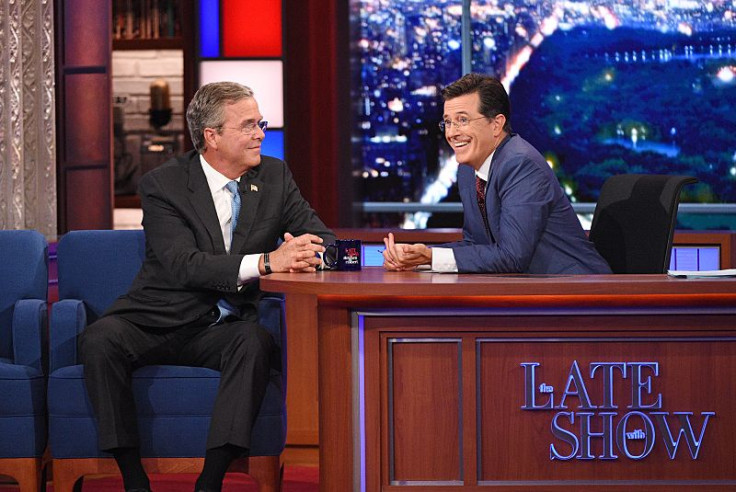How Stephen Colbert's Jeb Bush 'Late Show' Interview Proves He Could Bring An Edge Back To Late Night [VIDEO]

There were many signs Tuesday night that "The Late Show With Stephen Colbert" could be the answer to a stale late night genre -- Colbert's friendly irreverence for CBS and sponsors, his ability to get sharply political during a Donald Trump joke binge, band leader Jon Batiste's straight out of New Orleans jazz ensemble and their indie lineup of musical guests. However, it was the new "Late Show" host's interview with Republican Presidential candidate Jeb Bush that proved he had the goods to restore some well-needed edge to late night TV and uphold David Letterman's celebrity outsider legacy.
Interviewing what many -- assuming Donald Trump's campaign eventually fizzles -- believe to be the Republican nominee for President of the United States, Colbert did what he had done so many times during interviews on Comedy Central's "The Colbert Report," he made his guest uncomfortable. Whether lecturing the former Florida Governor on how to pause for crowd applause or laughing at the irony of Bush, who has been accused of being "low energy," claiming the exclamation mark in his "Jeb!" campaign merchandise "connotes excitement," Colbert had the Presidential candidate red-faced for much of the 10-minute segment.
Watch a clip from Stephen Colbert's interview with Jeb Bush below:
However, Colbert was never disrespectful and, subsequently, Bush was never embarrassing. In fact, Colbert gave Bush many opportunities to explain his policy, how he differs from his President brother and how he would handle D.C. divisiveness, but, despite Colbert's obviously left-leaning politics, the host had no policy specific follow-ups -- there were no "gotcha" questions." The ways in which Colbert made Bush sweat were those of a comedian poking fun at a powerful figure, not a political demagogue looking for the knockout punch. On policy, Bush was mostly able to stick to his talking points, but as a person, he was subjected to Colbert's jeers the way those sitting in the front row of a stand-up set fall victim to the performer's comedic wrath. It was humanizing. It was real.
Consider how differently guests have been treated by Colbert's competition. Many have criticized the nearly-all-new slate of late night hosts, including Jimmy Fallon on "The Tonight Show," Seth Meyers on "Late Night" and James Corden on "The Late, Late Show," for being "too nice," for steering towards lighter brands of comedy with a smaller chance of offending a highly sensitive internet public. Others have written that the trend has rubbed off on otherwise edgier hosts, such as Jimmy Kimmel on "Jimmy Kimmel Live" and Conan O'Brien on "Conan." When Fallon interviewed another Republican Presidential candidate, Chris Christie, a few weeks ago on "The Tonight Show," the host, as he often is, was excessively polite, deferring to what Christie came to the show to say instead of using his platform to prod at the man behind the facade.
Watch Jimmy Fallon interviewing Chris Christie on "The Tonight Show" below:
In addition to his chutzpah, Colbert flaunted a welcome candor during his Bush interview.
"There is a non-zero chance that I would vote for you," Colbert told Bush, explaining how the pair could discuss politics with civility. "You seem like a very reasonable guy."
Colbert's future presidential vote going to the Democrats would not be that surprising, but his suggestion that he is a voter waiting to be won over feels like a subtle revolution in late night. In the statement, Colbert is both unapologetically blunt in his admission that him voting for the Republican candidate is a long shot, yet refreshingly respectful in his willingness to hear another reasonable person out. Can anyone imagine Jimmy Fallon being that frank with a presidential candidate?
Colbert is replacing David Letterman, who for nearly two decades defined the late night landscape with his outsider appeal, approaching interviews with politicians and celebrities alike with a take-no-prisoners attitude -- a voice for the common man, or at least the common comic, and knocking inflated pop culture figures down a peg.
Watch David Letterman interview Donald Trump on "The Late Show" in 2013 below:
On Tuesday, Colbert displayed a similar willingness to hold celebrities' feet to the fire, but without the crotchety demeanor that was a trademark of Letterman. Colbert seems primed to pursue a level of honesty and integrity on his show, while still preserving, but not overdoing, the civility Fallon and company bring to the table.
Colbert's first "Late Show" interview, with actor and activist George Clooney, also showcased Colbert's Letterman-like outsider mentality. The host and the actor played part in a running joke that they were not friends outside of the show and, therefore, had nothing to talk about during their interview since Clooney did not have a project to promote. Hopefully, Colbert continues to play the role of the outsider. That is the edge late night needs right now, a dogma that could make late night TV the home for off-beat, boundary pushing, irreverent comedy that could again make late night interviews a venue to see celebrities and politicians humanized, not just promoted. Keep it up, Colbert!
Watch a bonus YouTube clip from the Jeb Bush interview below:
© Copyright IBTimes 2024. All rights reserved.












